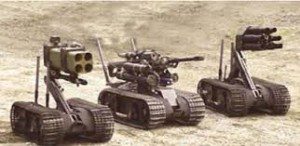Zack Beauchamp followed the CCW Experts Meeting on Autonomous Weapons and concluded:
The debate about robots in warfare comes down to the question of whether they would make war crimes more or less likely. There are serious arguments on either side. In many ways, this new argument about robots is an extension of much older argument about why war crimes happen and how to prevent them. This isn’t a joke anymore: the debate over military robotics is about preventing horrific abuse of real people.
 I agree with Zack that this is right way to think about the debate. Proponents of these weapons make various arguments, but the most compelling in human security terms is the argument that autonomous weapons could outperform humans on the battlefield when it comes to compliance with war law. Yet I am skeptical of this claim: I have argued this assumption overestimates the role of individual soldiers’ fallibility in producing war crimes, and underestimates the role of state policy in giving and forcing troops to carry out unlawful orders.
I agree with Zack that this is right way to think about the debate. Proponents of these weapons make various arguments, but the most compelling in human security terms is the argument that autonomous weapons could outperform humans on the battlefield when it comes to compliance with war law. Yet I am skeptical of this claim: I have argued this assumption overestimates the role of individual soldiers’ fallibility in producing war crimes, and underestimates the role of state policy in giving and forcing troops to carry out unlawful orders.
Beauchamp responds that surely this is true for dictatorships but not for democracies.
Of course, the story is different in modern liberal-democratic countries. Democratic countries generally don’t launch extermination campaigns, and at least nominally attempt to punish human rights abuses by their soldiers. So robots programmed by liberal-democratic regimes could, at least theoretically, improve on inherently flawed human judgments and cut out the cases where war crimes really are the result of bad apples or out-of-control rage and hatred on the ground level.
Political scientists however have found that democracies are no less likely to target civilians in armed conflicts and are perhaps more likely to. In his book Targeting Civilians in War, George Washington Univerity’s Alexander Downes finds that democracies are actually more likely to directly target civilians in historical terms, because they become desperate to win more quickly due to electoral pressures. If you don’t have time to read his whole book, Downes reiterates the argument in this journal article. This is not based on a few examples but rather a large-N dataset of civilian victimization in inter-state wars between 1816 and 2003, coding states for regime type.
James Morrow, a Professor of Political Science at University of Michigan, has also compiled a dataset, using 5-point scale of treaty violations in all twentieth-century wars. He too finds that regime type alone does not predict civilian victimization in wars, though he finds that regime type interacts with treaty ratification to exert some effect (although he finds compliance with the civilian protection rule to be weakest across the board of all laws of war he studied). In his article published in the American Journal of Political Science, Morrow states his finding “both supports and qualifies the argument by Downes that democracies are willing to kill civilians if they believe it will shorten the war.”
Point is: in empirical terms it’s not a good idea to assume that democracies are any less likely to target civilians in war than dictatorships. And if our concern is civilian protection, we want to make sure that is a harder decision to make, not an easier one.
Charli Carpenter is a Professor in the Department of Political Science at the University of Massachusetts-Amherst. She is the author of 'Innocent Women and Children': Gender, Norms and the Protection of Civilians (Ashgate, 2006), Forgetting Children Born of War: Setting the Human Rights
Agenda in Bosnia and Beyond (Columbia, 2010), and ‘Lost’ Causes: Agenda-Setting in Global Issue Networks and the Shaping of Human Security (Cornell, 2014). Her main research interests include national security ethics, the protection of civilians, the laws of war, global agenda-setting, gender and political violence, humanitarian affairs, the role of information technology in human security, and the gap between intentions and outcomes among advocates of human security.

Counterintuitive to many of us, & so well worth continuing research & this dialog. Why do those armed entities recently & currently resisting American/Western imperialism/peacekeeping/nation-building (whatever you call it) scrupulously avoid deploying constituted military forces apart from the populace? To force us to target the civilian population and thereby gain for moral high ground, of course, which they know we will be reluctant to do. I believe we try hard to avoid such targeting, although too often mistakes are made & we fall short of that objective. I do believe, however, that there is considerable evidence that authoritarian regimes are much less scrupulous.
And as I’ve said previously in comments here about “autonomous weapon systems” I believe this fear is overblown at present. We already have many autonomous systems in our military inventory; have had for decades. Any system that takes the human out of the line of fire in addition to automating a pre-approved decision process is, on balance, a step forward in warfighting.